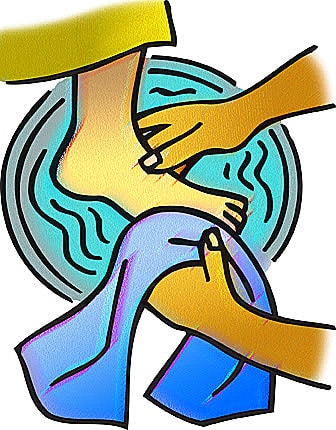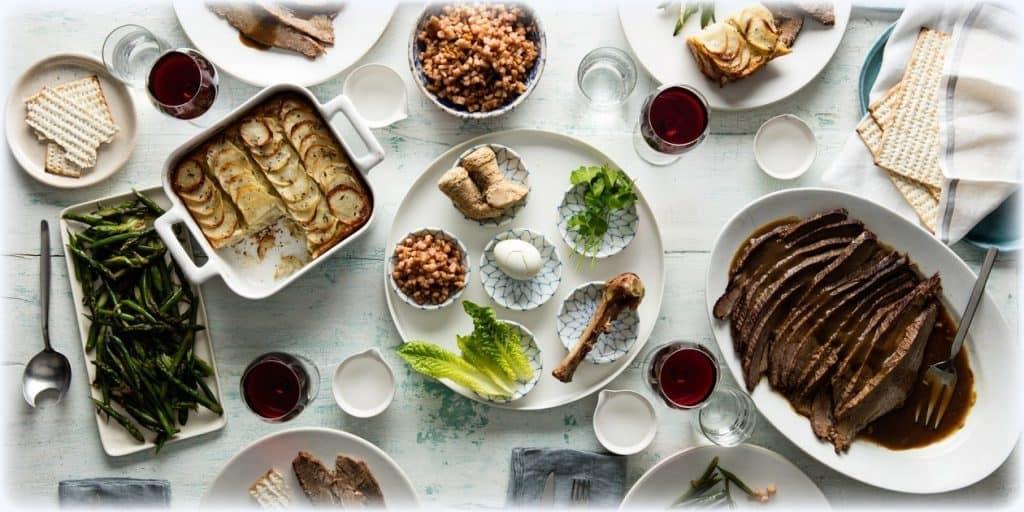Haggadah 6-11
6. Rachtzah – The Cleansing
Leader:
Now before the Feast of the Passover, when Jesus knew that his hour had come to depart out of this world to the Father, having loved his own who were in the world, he loved them to the end.
During supper, when the devil had already put it into the heart of Judas Iscariot, Simon’s son, to betray him, Jesus, knowing that the Father had given all things into his hands, and that he had come from God and was going back to God, rose from supper. He laid aside his outer garments, and taking a towel, tied it around his waist. Then he poured water into a basin and began to wash the disciples’ feet and to wipe them with the towel that was wrapped around him.
He came to Simon Peter, who said to him, “Lord, do you wash my feet?”
Jesus answered him, “What I am doing you do not understand now, but afterward you will understand.”
Peter said to him, “You shall never wash my feet.”
Jesus answered him, “If I do not wash you, you have no share with me.”
Simon Peter said to him, “Lord, not my feet only but also my hands and my head!”
Jesus said to him, “The one who has bathed does not need to wash, except for his feet, but is completely clean. And you are clean, but not every one of you.” For he knew who was to betray him; that was why he said, “Not all of you are clean.”
When he had washed their feet and put on his outer garments and resumed his place, he said to them, “Do you understand what I have done to you? You call me Teacher and Lord, and you are right, for so I am. If I then, your Lord and Teacher, have washed your feet, you also ought to wash one another’s feet. For I have given you an example, that you also should do just as I have done to you. Truly, truly, I say to you, a servant is not greater than his master, nor is a messenger greater than the one who sent him. If you know these things, blessed are you if you do them.” John 13.1-17
Leader explains Jesus’ actions during this part of the Seder and then couples may turn and wash one another’s feet if this is to be part of the ceremony.
People:
Blessed are you, O Lord our God, Ruler of the universe, who has sanctified us with your commandments and instructed us concerning the washing of one another’s feet.

![]()
7. Motzi – Giving Thanks and 8. Matzo – Eating the Matzah
Leader breaks the uppermost matzah and distributes while giving thanks for bread and sharing the significance of matzah as a symbol of our deliverance from bondage.
People:
Blessed are you, O Lord our God, Ruler of the universe, who has brought forth bread from the earth.
And blessed are you, O Lord our God, Ruler of the universe, who has commanded us to eat matzah.
Everyone eats the matzah.
9. Maror – Tasting the Bitter Herb
Leader discusses the meaning of the bitter herb and haroset while distributing some of each.
People:
Blessed are you, O Lord our God, Ruler of the universe, who has sanctified us with your commandments, and commanded us to eat the bitter herb.
Everyone eats a piece of whole horseradish dipped in haroset.
10. Korech – A Reminder of the Temple
Leader breaks the undermost matzah and distributes it along with the bitter herbs and haroset, then says:
While the Temple yet stood, Hillel introduced a custom of his own into the Seder service: he would put together a piece of the Paschal offering, a piece of matzah and a piece of the bitter herb, and eat all three together, in accordance with the instructions in Scripture:
They shall eat the flesh that night, roasted on the fire; with unleavened bread and bitter herbs they shall eat it. Exodus 12.8
In this way he said that he could taste slavery and freedom at the same time. It reminds me of our human condition: it is easier to take the man out of Egypt than to take Egypt out of the man. Even after being brought to freedom, we still carry the marks of our former bondage within us that must be cleansed. So within each of us are traces of the bitterness of our bondage, sweet remembrances of our good works, and the unleavened bread of freedom in the walk in the Spirit.
Everyone eats the matzah, bitter herb, and haroset together.
11. Shulchan Orech – The Passover Meal
Leader offers a blessing.
Everyone enjoys the festive meal
Traditional Menu
Appetizer: Matzo Ball Soup with Chicken Broth
Entree: Roast Brisket with Gravy or Stuffed Foul
Vegetables: Kugel (Potato, Matzo or Rice), Glazed Sweet Potatoes, Sunshine Carrot Coins, Broccoli, or Other
Garnishes: Matzah Rolls, Fresh Fruit, Haroset
Dessert: Coconut Macaroons, Carrot Cake, Date Squares, or Other

See The Biblical Festivals book for suggested recipes
